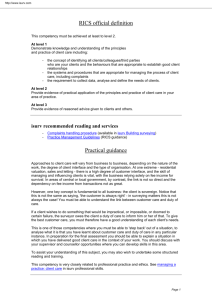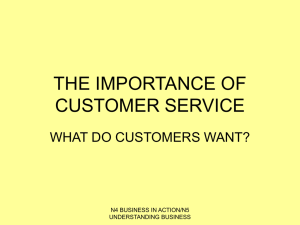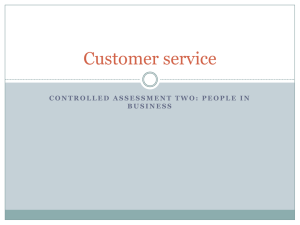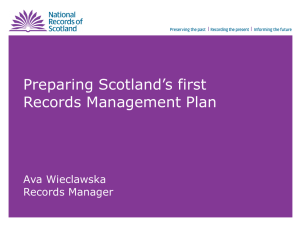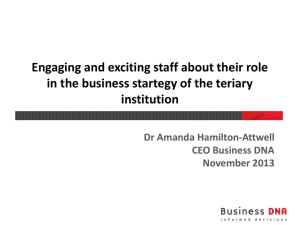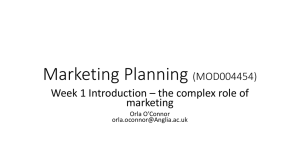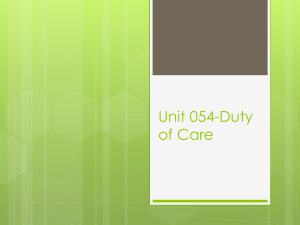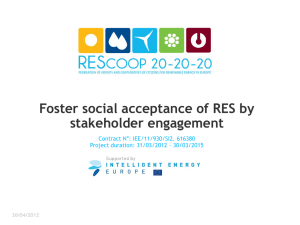Administrative Services Outcome 5
advertisement
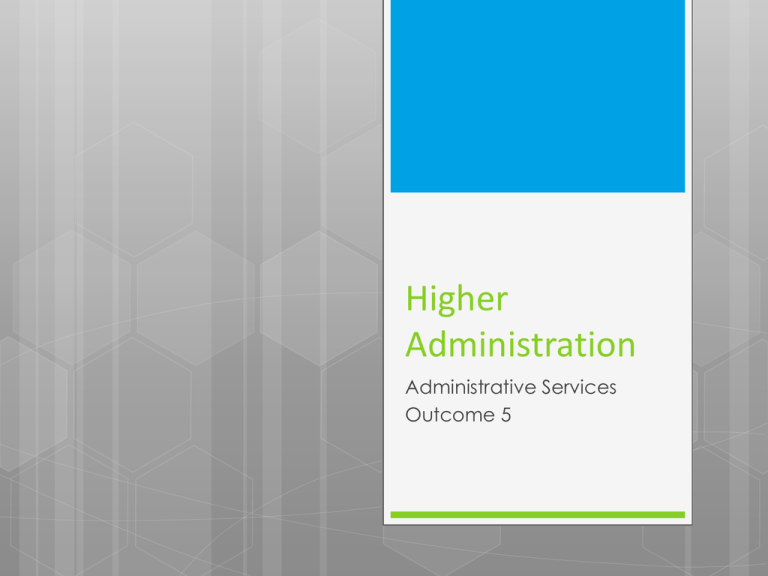
Higher Administration Administrative Services Outcome 5 Customer Service Policies Importance of Customer Service The most important aspect of a business... without good customer service there is no business! Mission Statement A statement which is usually a couple of sentences Employees are encouraged to learn it, which shares the management’s vision of how the organisation hopes to grow and develop DHL “DHL enhances the business of our customers by offering highest quality express and logistics solutions based on strong local expertise combined with the most extensive global network presence. Customers trust DHL as the preferred global express and logistics partner, leading the industry in terms of quality, profitability and market share” Ikea Ikea's mission is to offer a wide range of home furnishing items of good design and function, excellent quality and durability, at prices so low that the majority of people can afford to buy them. Virgin Atlantic "To grow a profitable airline, where people love to fly and people love to work" Customer Care Strategy A written statement of principles to ensure that the customer gets what they want at the right standard, quality and price. It will cover how the company will: Ensure the quality of its customer care Measure and test that customer needs are satisfied Ensure service level agreements are in place Deal with customer complaints Effect of Poor Customer Service Dissatisfied customers leading to a high level of complaints A bad reputation with the effect of a reduction in sales and therefore profits Administrative Assistant – Role when Dealing with Complaints Competence – professional and knowledgeable image, use the customers name when possible eg Miss Wright Confidence – keep eye contact and smile at the customer with positive body language Be Concerned – listen, be honest even if you have to give bad news Be Courteous – be polite, don’t argue – even if the customer is shouting/being abusive – be assertive but not aggressive Communicate – ask questions, take notes, pass on information, keep the customer informed Customer Care Strategy The standards a customer can expect A good customer service will allow an organisation to benefit from: Achieving customer satisfaction Increased sales Increased customer loyalty A good reputation Increased competitiveness Fewer complaints Customer Service Level Agreement An agreement between the organisation and the customer describing what the organisation promises to be able to do and what the customer can expect States what, how and when the organisation intends to deliver States what will happen if the organisation fails in its promise and commitment Outlines the responsibilities of both parties Specifies any extra or hidden costs Increases customer confidence and sets the standard for measurement and comparison with other organisations. Customer Service Benefits of Good Service Motivated and high performing staff Satisfied and loyal customers who recommend the business Reputation – attracting customers and staff Competitive edge Increased market share Effects of Poor Service Demoralised and demotivated staff Dissatisfied customers won’t return or recommend – loss of income Difficult to turn around a poor reputation Loss of status in the market place Downsize/increase spending on advertising/image REMEMBER! Survival Repeat depends on the customer customers are important customers Satisfaction is essential and depends on high quality and continual improvement Gerald Ratner He built up an extremely successful chain of jewellers during the 1980s, of which he was chief executive. The shops shocked the formerly staid jewellery industry by displaying fluorescent orange posters advertising cut price bargains and by offering low price ranges. Although widely regarded as "tacky", the shops and their wares were nevertheless extremely popular with the public, until Ratner made a speech at the Institute of Directors on 23 April 1991. During the speech, he commented: “We also do cut-glass sherry decanters complete with six glasses on a silver-plated tray that your butler can serve you drinks on, all for £4.95. People say, "How can you sell this for such a low price?", I say, "because it's total crap." He compounded this by going on to remark that some of the earrings were "cheaper than an M&S prawn sandwich but probably wouldn't last as long." Customers exacted their revenge by staying away from Ratner shops. After the speech, the value of the Ratner group plummeted by around £500 million, which very nearly resulted in the firm's collapse. Ratner resigned in November 1992 and the group changed its name to Signet Group in September 1993. Complaints Procedures Must be a specific policy in place to deal with these customers – remember not everyone will complain Sometimes referred to as Customer Retentions especially in Mobile/Broadband companies Dealing with Complaints All complaints should be treated seriously and logged They should be handled by specially trained staff They should be acknowledged and the customer should be kept informed of what is happening Time limits should be established eg all complaints dealt with within 10 working days The result of the investigation should be communicated to the customer Why Don’t People Complain? Don’t want to make a fuss Unpleasant nature of dealing with complaints Who to complain to? Too scared to approach staff Take up too much time Evaluating Policy If the customer care policy is evaluated it allows the organisation to: Monitor where complaints come from and what they are about Target where training or changes in procedures need to be introduced Assure customers of prompt attention at all times Show commitment to customers, encouraging their loyalty and gaining their trust and respect Customer Focus Organisations who show a willingness to find and eliminate customer problems achieve customer focus How to improve: Listen to what the customer has to say Conduct focus groups Customer satisfaction survey Best customer service awards Provide customer service training Internal newsletter – sharing good practice Provide warranties, guarantees and refunds Guarantees and Warranties is a formal promise – belief in product or service. Brings in more business even if ‘money-back’ guarantee offered. A guarantee A warranty states that a product/service will last for an appropriate length of time – if the need arises repairs/replacements offered at no extra cost Internet Research Visit Trading Standards… Look for advice leaflets for customers What products have been recalled in the last week? Visit Citizens Advice – Consumer Services How does the law protect your rights? Customer Satisfaction Questionnaires – often need an incentive like entry into a prize draw Comment cards – not always taken seriously eg after a meal in a restaurant Telephone – customers resent being interrupted at home, but often used as a courtesy call after eg home improvements to see if there are any problems (being pro-active) Interview – time consuming and expensive, unpleasant if people are rude Online surveys – often questions not read properly, often follows an online purchase Loyalty Cards Examples: Boots, Tesco, Nectar (Sainsbury) regular customers with ‘points’ which may translate to money off coupons Rewards Used to gather spending habits of customers in order to alter prices and extend special offers. Mystery Shopper This is a person who pretends to shop and experience the service and care ordinary customers receive. Feedback is then given to either praise employees, or to reinforce company policy. Sometimes staff can become aware of the mystery shopper and don’t always cooperate and can even be hostile if they feel that they are being spied on. What might be Mystery Shopped? Assessing Customer Service eg speed, communication Assessing customer experience in store eg cleanliness; product displays etc Assessing any hostility from company employees Are customer needs being met? Are policies being followed? Sample employee’s product knowledge Customer Focus Groups (1) Small groups of customers brought together to provide the organisation with feedback on their goods and services, proposed new products and lines that are no longer profitable. Feedback is immediate. Sometimes a marketing organisation will carry out the research – so the participants don’t know which company they are reporting on. Customer Focus Groups (2) to run – minimum would be travel expenses for participants. Expensive Information is only a sample of what all customers think at a certain point in time. For a national perspective, focus groups would need to be held throughout the country – time consuming exercise. Market Research Field new information is gathered for the business. what we have just looked at… (previous slides) Desk Research Research Information which already exists eg government statistics, competitor profiles, financial reports Quality Management Systems TQM (now just referred to as Quality Management) All employees have an individual and a collective responsibility for quality. Principle: “Get it right! First time! Every time!” Investors in People Relates to staff training and development. Awarded for 3 years, after which companies must reapply. 10 Key Indicators must be covered under 3 areas: Plan – Develop strategies to improve performance of the organsiation Do – Take action to improve the performacne of the organsiation Review – Evaluate the impact on the performance of the organsiation Investors in People Benefits to Employer Improved morale and motivation Increased productivity and profit Training closely linked to business objectives Increased customer satisfaction Improved reputation Positive publicity Benefits to Employee Recognition and improved job satisfaction Better communication on training and development issues Pride in belonging to the organisation Supportive working environment Communicating with Customers First impressions count! Remember body language and tone of voice. If an irate customer can be calmed by a pleasant, courteous and competent assistant, then the heat will be taken out of the situation. Call Centres Outsourcing to foreign call centres (eg India) may anger and frustrate some customers if a complaint is not being treated seriously. PlusNet (ISP) advertises a Yorkshire based call centre In general this is a cost effective method of dealing with customers. However, they can get easily confused if a large number of automated call menu options are presented Complaints in Writing This creates a permanent record, replies can be kept for future reference (especially if the customer contacts again). Email is becoming more important, however this has the drawback that a customer might expect an immediate response. E-commerce (Customer Service) A well-designed, easy to use and up-to-date website will encourage customers. Available 24/7 and as more people gain confidence in using the Internet this will save the organisation costs in terms of staff, storage and advertising. Dealing with Customers Face to Face Can identify uncertainties and clarify immediately Allows for subtle questioning Demonstrations can be given Body language can be read May help to defuse the situation (personal contact) Up-selling may increase sales Higher Administration Administrative Services Outcome 5
